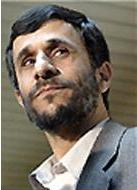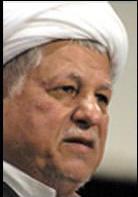
vs.

Today I saw that the Iranian election is now narrowed down to a runoff between the top two candidates. Originally there were 8, all hard-line Islamist males (no surprise there). The two runoff candidates are Ali Akhbar Hashemi Rafsanjani, who used to be President of Iran, and Mahmoud Ahmadinejad, who's currently the mayor of Tehran. Mr. Rafsanjani is known as a more liberal-minded reformer (as Iranian politicans go), who supports increased social freedoms and privatization and is open to a more positive relationship with the United States. Mr. Ahmadinejad is a conservative defined by his belief in the strategies and ideals of the 1979 revolution. He seeks a more centrally planned economy, a more adversarial relationship with the enemies of Iran (i.e. Israel and the U.S.), and more than likely a rollback (or at least a freeze) on social freedoms.
All this got me thinking about the credentials and history of all the candidates, and what their views might have meant for Iran, the greater Arab world, and the global political climate. So I did a bit of research and discovered that...
almost without exception, the candidates have strong links to the Islamic Revolutionary Guards Corps or to international terrorism.
The Islamic Revolutionary Guards Corps is the 'ideological army' of the regime. They function at times like a secret police, but their presence is rarely secret. They suppress dissidents and enforce ideological purity (according to the Iranian government's fundamentalist twist on Islam).
Here's some highlights from Ahmadinejad's profile:
Ahmadinejad was a top commander of the Islamic Revolutionary Guards Corps.
Following the 1979 Islamic revolution he joined an ultra-conservative faction of the Office for Strengthening Unity. Ahmadinejad’s activities in the Revolutionary Guards were directly related to suppression of dissidents in Iran and terrorist attacks abroad. A recently revealed document has shown his involvement in planning an attempt on the life of the Indian-born British author Salman Rushdie. He is presently a member of the right-wing Association of Engineers and a member of the central council of the Society of the Devotees of the Islamic Revolution. As mayor of Tehran, he moved to restrict activities in cultural centres in the capital, turning them into religious centres.
In his own Words:
"We did not have a revolution in order to have democracy".
(United International Press, May 24, 2005)
and Rafsanjani:
After the revolution he became a member of the Revolutionary Council; after a short spell as Interior Minister, he became Majlis (parliament) Speaker in 1980. Khomeini gave Rafsanjani much greater powers than his official position allowed. He was made the acting Commander in Chief of the Armed Forces and, according to insiders, no important policy decision was made without his approval. After Khomeini’s death in 1989, Rafsanjani became President for two terms. Since then he has chaired the powerful State Expediency Council, which acts as a supreme arbitration body to settle disputes between the Majlis and the watchdog Guardians Council.
The criminal court of Berlin issued an international warrant for Rafsanjani’s arrest after he was found to be a key member of a four-man committee that made the decisions for assassination of Iranian dissidents abroad. Rafsanjani’s past is heavily tainted with involvement in international terrorism; as President he personally oversaw much of the activities of VEVAK, Iran’s dreaded secret police, and dozens of terrorist attacks abroad were carried out under his command, including the bombing of Khobar Towers in Saudi Arabia in 1996, which killed 19 U.S. servicemen, and the bombing of the Jewish community centre in Buenos Aires in 1994. More than 80 people died in that attack.
Rafsanjani is widely seen as the father of Iran’s nuclear weapons program. The initial phase of the program in the early 1980s was carried out under his supervision as the acting Commander in Chief. The greatest advancements in the nuclear project, from uranium enrichment technology to plutonium extraction methods, were made under his direction (as Commander in Chief, and later as President).
Described as a pragmatic conservative abroad, inside Iran Rafsanjani is best known by two distinguishing traits; the first being his mass fortune, as compared to the disastrous economy he left after his tenure. Parallel to this is his willingness to use extreme force to quell dissent and his role in the chain murders of dissidents who dared to voice their opposition to the current theocratic system. His role in these killings earned him the nickname “The Grey Eminence” after a book by jailed journalist Akbar Ganji.
During Rafsanjani’s presidency hundreds of writers, journalists, and other intellectuals were imprisoned, murdered, or simply “disappeared”.
Rafsanjani on terrorism:
"If in retaliation for every Palestinian martyred in Palestine they kill and execute, not inside Palestine, five Americans, or Britons or Frenchmen [the Israelis] would not continue these wrongs.
"It is not difficult to kill Americans or Frenchmen. It is a bit difficult to kill [Israelis]. But there are so many [Americans and Frenchmen] everywhere in the world".
(Speaking at a Friday prayers congregation on May 5, 1989)
The other candidates weren't much better. There were lots of links to violent repression of dissidents, anti-Semitic propaganda, and the planning and execution of Iranian state-sponsored terrorism abroad (one defeated candidate was directly involved in the planning and execution of the 1983 bombing of the U.S. Marines compound in Beirut, which left behind 242 dead, and the bombing of the Jewish community centre in Buenos Aires in 1994, which killed 86 - in coordination with Mr. Rafsanjani).
Of the 8 candidates 5 were formerly top Revolutionary Guards officials (including Mr. Ahmadinejad).
Good information on the candidates (defeated and still running) is available at Iran Focus, from where I stole lots of the above text.
Also:
Good News?
Italian Judge Orders Arrest of 13 CIA Operatives for Kidnapping
That question mark is a biggie.
and:
This Just In: Tom Cruise is Insane
Cruise Clashes With Lauer on 'Today' Show
No comments:
Post a Comment